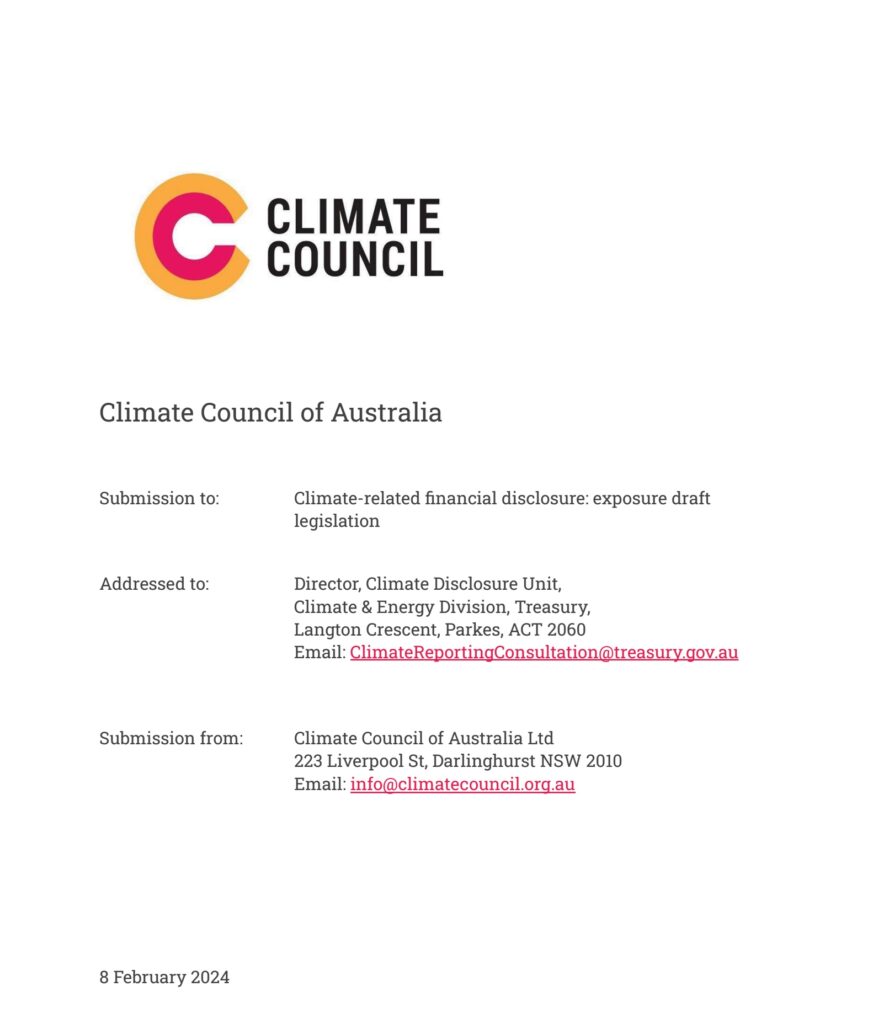The Climate Council welcomes the release of the Australian Government’s climate-related financial disclosure exposure draft legislation, and appreciates the opportunity to provide input for this consultation.
July 2023 was the first month in which the global average temperature rise spiked 1.5 degrees celsius (°C) above pre industrial levels. Summer in the northern hemisphere was marked by persistent and intense heatwaves across the United States, Southern Europe and China. Massive fires devastated communities in parts of Northern Africa, Greece,Hawaii and Canada. Smoke from the Canadian wildfires blanketed New York City, forcing schools to close and flights to be grounded. Deadly downpours and flash flooding saw llives lost and thousands displaced in Korea and India (Climate Council, 2023a).
Closer to home, we are midway through the Australian summer of 2023-24, and already seeing both devastating fires and floods. The New South Wales Rural Fire Service announced an early start to the fire danger season in August 2023 (ABC, 2023) and by November 2023, more than 610,000 square kilometres had burnt across north Australia, an area larger than Spain (The Guardian, 2023a). On the east coast, storms and flash flooding tragically took ten lives over Christmas (The Guardian, 2023b).
These are the consequences of climate change, driven by burning fossil fuels, that Australians are already experiencing at 1.2°C of warming (Climate Council, 2023a). Stated climate commitments from global governments have the world on track not only to exceed the 1.5°C goal of the Paris Agreement, but blow past it, with up to 2.7°C degrees of global temperature rise projected (Climate Action Tracker, 2023).
Corporations contribute to harmful climate change through carbon pollution produced in their direct operations and along their supply chains. The Carbon Majors Report has highlighted that just 100 companies have produced 71 percent of the world’s greenhouse gas emissions between 1988 and 2017 (Griffin, 2017). At the same time, climate change is itself a risk to corporations as they face an increasingly volatile physical and economic environment. Key climate-related risks include both physical risks from climate change and transition risks associated with moving to a low emissions economy. Globally, a rapid reduction in demand for fossil fuels has been estimated to prompt economic losses of US$1-4 trillion by 2035 (Mercure et al., 2018). Currently no ASX300 company is reportedly on track to reach net zero by 2050 (Morningstar Analytics, 2023).
A changing climate threatens the resilience and long term viability of some entities, while also presenting opportunities for many as the world works to cut carbon pollution. These climate-related risks and opportunities have major implications for investment decisions. Investors need credible, transparent and comparable information to make responsible investment decisions. Unfortunately, large amounts of money is still being funnelled into expanding fossil fuels, which is what’s driving climate change. Investors need credible,
transparent and comparable climate-related financial disclosures to allocate capital responsibly. Climate-related financial disclosures are a critical mechanism for shining a spotlight on how exposed corporations are to escalating climate risks, and whether they are taking genuine steps to address these. This will help individual corporations and financial markets as a whole better manage climate risks and progressively direct capital to its most constructive uses in a decarbonising economy.
Given this, the Climate Council welcomes and strongly endorses the move to require climate-related financial disclosures by aligning Australian corporate reporting requirements with the international standards set by the International Financial Reporting Standards (IFRS) Foundation. We encourage full adoption as rapidly as possible to build sector capacity to assess climate risks, and then act effectively on them. We highlight the need to drive early inclusion of Scope 3 emissions reporting (from the first year of reporting) and the importance of including disclosures about the use of credits to offset carbon emissions.
The Climate Council encourages the Government and the financial accountability community to approach this legislation as the first step in a further series of regulatory reforms requiring companies to actively reduce climate-related risks, once these are transparently identified. Our submission includes a range of recommendations for further action following implementation of this initial legislation.
Within this context of strong support for the proposed direction of reform, we provide the following comments in response to the exposure draft legislation.
Summary of recommendations
Recommendation 1
The Climate Council recommends maximising coverage of the mandate. Option 1 in the Policy Impact Analysis to require full disclosure by Group 3 entities is preferred.
Recommendation 2
The Climate Council recommends the climate-related financial disclosures for Group 1 commence as planned on 1 July 2024, with the regime then phased in over a period of three years (rather than the proposed four year period), with the final year no later than 2026-27.
Recommendation 3
The Climate Council recommends keeping the commencement date for Group 1 entities at 1 July 2024 over commencing on 1 January 2025. Commencing earlier will drive entities to begin the learning process associated with making these disclosures at the earliest opportunity.
Recommendation 4
The Climate Council welcomes the inclusion of qualitative and quantitative scenario analysis of at least two possible future scenarios, with one being aligned with the strongest global temperature goal in the Climate Change Act 2022 (i.e. limiting global warming to 1.5 ̊C). We trongly support including this requirement in legislation.
Recommendation 5
The Climate Council welcomes the inclusion of Scope 3 emissions reporting and recommends that all entities be required to include Scope 3 emissions from the first year of reporting, with limited liability mechanisms in the first year.
Recommendation 6
The Climate Council strongly supports the requirement for reporting entities to disclose detailed information about their planned use of carbon credits to offset their greenhouse gas emissions.
Additional recommendations for further action beyond the disclosure regime
Use rules applying to all Authorised Deposit-taking Institutions (ADI) to mandate banks conduct climate stress testing on their portfolios, to take into account climate risk and lending for climatic and financial stability.
Direct the Council of Financial Regulators to pursue international negotiations over improvements to the Basel Capital Framework addressing climate risk. Require fossil fuel projects’ remediation costs to be accounted for within corporate balance sheets on a time frame consistent with limiting warming close to 1.5 ̊C (for APRA).
Mitigate risk to the financial system by increasing minimum capital requirements for banks which have, and/or continue adding to, portfolios with significant exposure to fossil fuels (for APRA).
Lead negotiations for an update to the Basel Framework to embed climate risk within it (for APRA and RBA).











